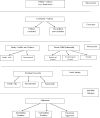A Social-Ecological, Process-Oriented Perspective on Political Violence and Child Development
- PMID: 26877765
- PMCID: PMC4749157
- DOI: 10.1111/cdep.12067
A Social-Ecological, Process-Oriented Perspective on Political Violence and Child Development
Abstract
Youths' risk for adjustment problems in contexts of political violence is well-documented. However, outcomes vary widely, with many children functioning well. Accordingly, moving beyond further documenting the risk for many negative outcomes associated with living in contexts of political violence, a second generation of research is moving towards identifying the mechanisms and conditions that contribute to children's adjustment. Increasing support is emerging for understanding effects on children in terms of changes in the social contexts in which children live, and in the psychological processes engaged by these social ecologies. Selected themes are considered, including (a) the need to study multiple levels of the social ecology, (b) differentiating between the effects of exposure to contexts of political versus non-political violence, and (c) theories about explanatory processes. Selected research pertinent to these directions is reviewed, including findings from a six-wave longitudinal study on political violence and children in Northern Ireland.
Keywords: Child adjustment; Community violence; Emotional security; Family conflict; Political violence; Social ecological model.
Figures




Similar articles
-
Children and political violence from a social ecological perspective: implications from research on children and families in Northern Ireland.Clin Child Fam Psychol Rev. 2009 Mar;12(1):16-38. doi: 10.1007/s10567-009-0041-8. Clin Child Fam Psychol Rev. 2009. PMID: 19229611 Free PMC article. Review.
-
Political violence and child adjustment in Northern Ireland: Testing pathways in a social-ecological model including single-and two-parent families.Dev Psychol. 2010 Jul;46(4):827-41. doi: 10.1037/a0019668. Dev Psychol. 2010. PMID: 20604605 Free PMC article.
-
Testing a social ecological model for relations between political violence and child adjustment in Northern Ireland.Dev Psychopathol. 2010 May;22(2):405-18. doi: 10.1017/S0954579410000143. Dev Psychopathol. 2010. PMID: 20423550 Free PMC article.
-
Longitudinal pathways between political violence and child adjustment: the role of emotional security about the community in Northern Ireland.J Abnorm Child Psychol. 2011 Feb;39(2):213-24. doi: 10.1007/s10802-010-9457-3. J Abnorm Child Psychol. 2011. PMID: 20838875 Free PMC article.
-
A social-cognitive-ecological framework for understanding the impact of exposure to persistent ethnic-political violence on children's psychosocial adjustment.Clin Child Fam Psychol Rev. 2009 Jun;12(2):113-26. doi: 10.1007/s10567-009-0050-7. Clin Child Fam Psychol Rev. 2009. PMID: 19430904 Free PMC article. Review.
Cited by
-
Area level indirect exposure to extended conflicts and early childhood anthropometric outcomes in India: a repeat cross-sectional analysis.Confl Health. 2023 May 7;17(1):23. doi: 10.1186/s13031-023-00519-8. Confl Health. 2023. PMID: 37150814 Free PMC article.
-
Children's Resilience to Ongoing Border Attacks: The Role of Father, Mother, and Child Resources.Child Psychiatry Hum Dev. 2023 Aug;54(4):1015-1026. doi: 10.1007/s10578-021-01303-6. Epub 2022 Jan 22. Child Psychiatry Hum Dev. 2023. PMID: 35064393
-
Youth in Northern Ireland: Linking Violence Exposure, Emotional Insecurity, and the Political Macrosystem.Monogr Soc Res Child Dev. 2020 Dec;85(4):7-123. doi: 10.1111/mono.12423. Monogr Soc Res Child Dev. 2020. PMID: 33184897 Free PMC article.
-
Supportive Relationships in Children and Adolescents Facing Political Violence and Mass Disasters.Curr Psychiatry Rep. 2019 Aug 13;21(9):83. doi: 10.1007/s11920-019-1068-2. Curr Psychiatry Rep. 2019. PMID: 31410719 Review.
-
Evaluating the Role of Maternal and Paternal Trauma Exposure, Emotional Security, and Mental Health in Predicting Psychological Adjustment among Palestinian Adolescents.Int J Environ Res Public Health. 2022 Jul 29;19(15):9288. doi: 10.3390/ijerph19159288. Int J Environ Res Public Health. 2022. PMID: 35954645 Free PMC article.
References
-
- Barber BK. Annual research review: The experience of youth with political conflict—Challenging notions of resilience and encouraging research refinement. Journal of Child Psychology and Psychiatry. 2013;54:461–473. - PubMed
-
- Bar-Tal D, Jacobson D. A psychological perspective on security. Applied Psychology: An International Review. 1998;47(1):59–71.
-
- Bleich A, Gelkopf M, Solomon Z. Exposure to terrorism, stress-related mental health symptoms, and coping behaviors among a nationally representative sample in Israel. JAMA: Journal of the American Medical Association. 2003;290:612–620. - PubMed
Grants and funding
LinkOut - more resources
Full Text Sources
Other Literature Sources
